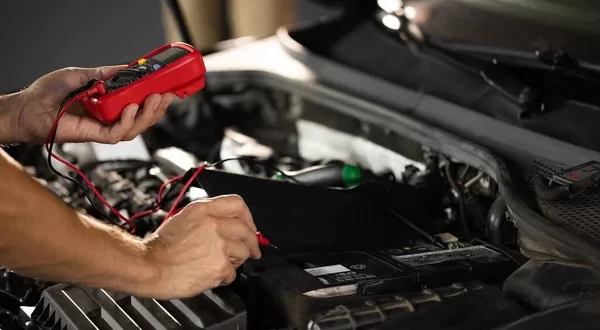Although car electrical issues might be annoying, you can frequently locate and fix them with a little troubleshooting skills. Ten typical electrical issues with cars are listed below, along with possible solutions for each:
Blown Fuses
A blown fuse may be the cause of some electrical components failing to function. Check the matching fuse for the damaged component in the fuse box, located typically under the dashboard or in the engine compartment. Put in a new fuse with the same rating to replace the blown one.
Bad Alternator
A faulty alternator can result in a battery that is depleted or dim headlights. The voltage at the battery terminals should be measured using a multimeter while the engine is running to make sure. It may be necessary to repair or replace the alternator if the reading is less than 13.5 volts.
Dead Battery
A dead battery may be the cause if your car won’t start or you hear clicking when you turn the key. Jump-start the car or use a battery charger to troubleshoot. The battery might need to be replaced if it keeps dying often.
Faulty Starter Motor
The starting motor may be malfunctioning if you hear clicking but the engine won’t start. To test if it helps, try lightly tapping the starter motor with a wrench or hammer. The starter motor may need to be repaired or replaced if the issue continues.
Bad Spark Plugs
It’s possible that old or clogged spark plugs are to blame for the engine’s misfiring, poor operation, or starting difficulties. Spark plugs should be taken out and examined. Depending on what the manufacturer advises, clean them or replace them.
Bad Ignition Switch
A malfunctioning ignition switch may make it impossible for the car to start or result in brief power failures. When the key is in the accessory position, check to see if the lights and electrical parts function. If not, you might need to replace the ignition switch.
Faulty Power Window Motor
If a power window won’t go up or down, the window motor may be at fault. Check the wire connections and window switch first. If they’re in good shape, the motor might need to be changed.
Defective Wiring
Several electrical problems can be caused by corroded or damaged wire. Look for any visible damage or loose connections in the wire harness. To check the resistance and continuity of wires, use a multimeter. If necessary, fix or swap out broken wires.
Non-Functioning Central Locking
A malfunctioning actuator or a remote key fob could be to blame for the central locking system’s malfunction. Make sure the key fob battery is functioning properly by testing it. The actuator might need to be replaced if the problem persists.
Dim or Flickering Lights
A faulty alternator, loose connections, or a weak battery may be indicated by dim or flickering headlights, interior lights, or dashboard lights. Examine the alternator output and battery connections. Consult a specialist for a diagnosis if the issue continues.
Remember, it’s always advised to seek help from an experienced mechanic or automotive specialist if you’re uncertain about any troubleshooting methods or the complexity of the issue. Reach out to a specialist HERE for advise or inspection.
 Spot Dem Everything About Cars
Spot Dem Everything About Cars



